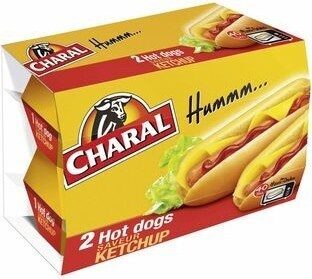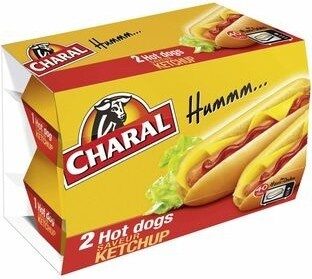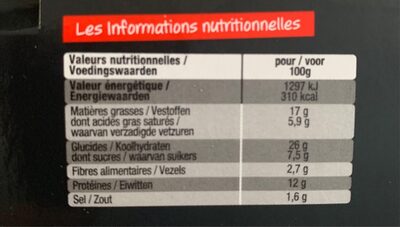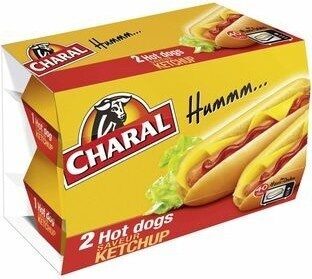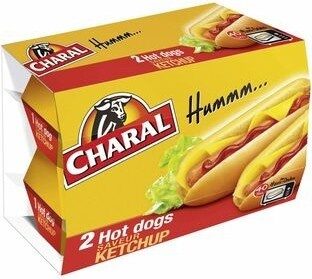Help us make food transparency the norm!
As a non-profit organization, we depend on your donations to continue informing consumers around the world about what they eat.
The food revolution starts with you!
2 Hot Dogs saveur ketchup - Charal - 240 g (2 x 120 g)
2 Hot Dogs saveur ketchup - Charal - 240 g (2 x 120 g)
Barcode: 3181232138925 (EAN / EAN-13)
Quantity: 240 g (2 x 120 g)
Packaging: Fresh
Brands: Charal
Categories: Meats and their products, Meals, Sandwiches, Meals with meat, Hot dog sandwiches
Origin of ingredients: France, Unspecified
Stores: carrefour.fr
Countries where sold: France
Matching with your preferences
Health
Ingredients
-
56 ingredients
: Pain spécial 49% : farine de blé, eau, dextrose, levure, huile de colza, sucre, gluten de blé, sel, conservateur : E282, vinaigre, émulsifiants :E471, E472e, farine de fève, antioxydant : E300. Saucisse de Strasbourg 28% : viande de porc 82% (soit 23% sur produit total), gras de porc, eau, plasma de porc, sel, dextrose, épices, stabilisant: E451, arômes, colorants: E120, E160c, antioxydant: E316, conservateur: E250. Fromage fondu 14% : fromage 70% (soit 10% sur produit total), eau, beurre, protéines de lait, sels de fonte : E452, E450, E339, E341, sel. Sauce saveur ketchup 9% : eau, concentré de tomates 25% (soit 2% sur produit total), sucre, vinaigre, amidon transformé de mais, sel, oignons déshydratés, arômes.Allergens: Gluten, MilkTraces: Mustard, Sesame seeds
Food processing
-
Ultra processed foods
Elements that indicate the product is in the 4 - Ultra processed food and drink products group:
- Additive: E120 - Cochineal
- Additive: E14XX - Modified Starch
- Additive: E160c - Paprika extract
- Additive: E450 - Diphosphates
- Additive: E451 - Triphosphates
- Additive: E452 - Polyphosphates
- Additive: E471 - Mono- and diglycerides of fatty acids
- Additive: E472e - Mono- and diacetyltartaric acid esters of mono- and diglycerides of fatty acids
- Ingredient: Colour
- Ingredient: Dextrose
- Ingredient: Emulsifier
- Ingredient: Flavouring
- Ingredient: Glucose
- Ingredient: Gluten
- Ingredient: Milk proteins
Food products are classified into 4 groups according to their degree of processing:
- Unprocessed or minimally processed foods
- Processed culinary ingredients
- Processed foods
- Ultra processed foods
The determination of the group is based on the category of the product and on the ingredients it contains.
Additives
-
E120 - Cochineal
Carminic acid: Carminic acid -C22H20O13- is a red glucosidal hydroxyanthrapurin that occurs naturally in some scale insects, such as the cochineal, Armenian cochineal, and Polish cochineal. The insects produce the acid as a deterrent to predators. An aluminum salt of carminic acid is the coloring agent in carmine. Synonyms are C.I. 75470 and C.I. Natural Red 4. The chemical structure of carminic acid consists of a core anthraquinone structure linked to a glucose sugar unit. Carminic acid was first synthesized in the laboratory by organic chemists in 1991.Source: Wikipedia
-
E250 - Sodium nitrite
Sodium nitrite: Sodium nitrite is the inorganic compound with the chemical formula NaNO2. It is a white to slightly yellowish crystalline powder that is very soluble in water and is hygroscopic. It is a useful precursor to a variety of organic compounds, such as pharmaceuticals, dyes, and pesticides, but it is probably best known as a food additive to prevent botulism. It is on the World Health Organization's List of Essential Medicines, the most important medications needed in a basic health system.Nitrate or nitrite -ingested- under conditions that result in endogenous nitrosation has been classified as "probably carcinogenic to humans" by International Agency for Research on Cancer -IARC-.Source: Wikipedia
-
E282 - Calcium propionate
Calcium propanoate: Calcium propanoate or calcium propionate has the formula Ca-C2H5COO-2. It is the calcium salt of propanoic acid.Source: Wikipedia
-
E316 - Sodium erythorbate
Sodium erythorbate: Sodium erythorbate -C6H7NaO6- is a food additive used predominantly in meats, poultry, and soft drinks. Chemically, it is the sodium salt of erythorbic acid. When used in processed meat such as hot dogs and beef sticks, it increases the rate at which nitrite reduces to nitric oxide, thus facilitating a faster cure and retaining the pink coloring. As an antioxidant structurally related to vitamin C, it helps improve flavor stability and prevents the formation of carcinogenic nitrosamines. When used as a food additive, its E number is E316. The use of erythorbic acid and sodium erythorbate as a food preservative has increased greatly since the U.S. Food and Drug Administration banned the use of sulfites as preservatives in foods intended to be eaten fresh -such as ingredients for fresh salads- and as food processors have responded to the fact that some people are allergic to sulfites. It can also be found in bologna, and is occasionally used in beverages, baked goods, and potato salad.Sodium erythorbate is produced from sugars derived from different sources, such as beets, sugar cane, and corn. An urban myth claims that sodium erythorbate is made from ground earthworms; however, there is no truth to the myth. It is thought that the genesis of the legend comes from the similarity of the chemical name to the words earthworm and bait.Alternative applications include the development of additives that could be utilized as anti-oxidants in general. For instance, this substance has been implemented in the development of corrosion inhibitors for metals and it has been implemented in active packaging.Sodium erythorbate is soluble in water. The pH of the aqueous solution of the sodium salt is between 5 and 6. A 10% solution, made from commercial grade sodium erythorbate, may have a pH of 7.2 to 7.9. In its dry, crystalline state it is nonreactive. But, when in solution with water it readily reacts with atmospheric oxygen and other oxidizing agents, which makes it a valuable antioxidant.Source: Wikipedia
-
E339 - Sodium phosphates
Sodium phosphates: Sodium phosphate is a generic term for a variety of salts of sodium -Na+- and phosphate -PO43−-. Phosphate also forms families or condensed anions including di-, tri-, tetra-, and polyphosphates. Most of these salts are known in both anhydrous -water-free- and hydrated forms. The hydrates are more common than the anhydrous forms.Source: Wikipedia
-
E341 - Calcium phosphates
Calcium phosphate: Calcium phosphate is a family of materials and minerals containing calcium ions -Ca2+- together with inorganic phosphate anions. Some so-called calcium phosphates contain oxide and hydroxide as well. They are white solids of nutritious value.Source: Wikipedia
-
E450 - Diphosphates
Diphosphates (E450) are food additives often utilized to modify the texture of products, acting as leavening agents in baking and preventing the coagulation of canned food.
These salts can stabilize whipped cream and are also found in powdered products to maintain their flow properties. They are commonly present in baked goods, processed meats, and soft drinks.
Derived from phosphoric acid, they're part of our daily phosphate intake, which often surpasses recommended levels due to the prevalence of phosphates in processed foods and drinks.
Excessive phosphate consumption is linked to health issues, such as impaired kidney function and weakened bone health. Though diphosphates are generally regarded as safe when consumed within established acceptable daily intakes, it's imperative to monitor overall phosphate consumption to maintain optimal health.
-
E451 - Triphosphates
Sodium triphosphate: Sodium triphosphate -STP-, also sodium tripolyphosphate -STPP-, or tripolyphosphate -TPP-,- is an inorganic compound with formula Na5P3O10. It is the sodium salt of the polyphosphate penta-anion, which is the conjugate base of triphosphoric acid. It is produced on a large scale as a component of many domestic and industrial products, especially detergents. Environmental problems associated with eutrophication are attributed to its widespread use.Source: Wikipedia
-
E471 - Mono- and diglycerides of fatty acids
Mono- and diglycerides of fatty acids (E471), are food additives commonly used as emulsifiers in various processed foods.
These compounds consist of glycerol molecules linked to one or two fatty acid chains, which help stabilize and blend water and oil-based ingredients. E471 enhances the texture and shelf life of products like margarine, baked goods, and ice cream, ensuring a smooth and consistent texture.
It is generally considered safe for consumption within established regulatory limits.
Ingredients analysis
-
May contain palm oil
Ingredients that may contain palm oil: E471, E472e, Pork fat
-
Non-vegan
Non-vegan ingredients: fr:Saucisse de strasbourg, Pork meat, Pork fat, fr:Plasma de porc, E120, Melted cheese, Cheese, Butter, Milk proteinsSome ingredients could not be recognized.
We need your help!
You can help us recognize more ingredients and better analyze the list of ingredients for this product and others:
- Edit this product page to correct spelling mistakes in the ingredients list, and/or to remove ingredients in other languages and sentences that are not related to the ingredients.
- Add new entries, synonyms or translations to our multilingual lists of ingredients, ingredient processing methods, and labels.
If you would like to help, join the #ingredients channel on our Slack discussion space and/or learn about ingredients analysis on our wiki. Thank you!
-
Non-vegetarian
Non-vegetarian ingredients: fr:Saucisse de strasbourg, Pork meat, Pork fat, fr:Plasma de porc, E120Some ingredients could not be recognized.
We need your help!
You can help us recognize more ingredients and better analyze the list of ingredients for this product and others:
- Edit this product page to correct spelling mistakes in the ingredients list, and/or to remove ingredients in other languages and sentences that are not related to the ingredients.
- Add new entries, synonyms or translations to our multilingual lists of ingredients, ingredient processing methods, and labels.
If you would like to help, join the #ingredients channel on our Slack discussion space and/or learn about ingredients analysis on our wiki. Thank you!
-
Details of the analysis of the ingredients
We need your help!
Some ingredients could not be recognized.
We need your help!
You can help us recognize more ingredients and better analyze the list of ingredients for this product and others:
- Edit this product page to correct spelling mistakes in the ingredients list, and/or to remove ingredients in other languages and sentences that are not related to the ingredients.
- Add new entries, synonyms or translations to our multilingual lists of ingredients, ingredient processing methods, and labels.
If you would like to help, join the #ingredients channel on our Slack discussion space and/or learn about ingredients analysis on our wiki. Thank you!
: Pain spécial 49% (farine de blé), eau, dextrose, levure, huile de colza, sucre, gluten de blé, sel, conservateur (e282), vinaigre, émulsifiants (e471), e472e, farine de fève, antioxydant (e300, Saucisse de Strasbourg 28%), viande de porc 82% (), gras de porc, eau, plasma de porc, sel, dextrose, épices, stabilisant (e451), arômes, colorants (e120), e160c, antioxydant (e316), conservateur (e250, Fromage fondu 14%), fromage 70% (), eau, beurre, protéines de lait, sels de fonte (e452), e450, e339, e341, sel, Sauce saveur ketchup 9% (eau), concentré de tomates 25% (), sucre, vinaigre, amidon transformé de mais, sel, oignons déshydratés, arômes- Pain spécial -> en:special-bread - percent: 49
- farine de blé -> en:wheat-flour - vegan: yes - vegetarian: yes - ciqual_proxy_food_code: 9410
- eau -> en:water - vegan: yes - vegetarian: yes - ciqual_food_code: 18066
- dextrose -> en:dextrose - vegan: yes - vegetarian: yes - ciqual_proxy_food_code: 31016
- levure -> en:yeast - vegan: yes - vegetarian: yes
- huile de colza -> en:colza-oil - vegan: yes - vegetarian: yes - from_palm_oil: no - ciqual_food_code: 17130
- sucre -> en:sugar - vegan: yes - vegetarian: yes - ciqual_proxy_food_code: 31016
- gluten de blé -> en:wheat-gluten - vegan: yes - vegetarian: yes
- sel -> en:salt - vegan: yes - vegetarian: yes - ciqual_food_code: 11058
- conservateur -> en:preservative
- e282 -> en:e282 - vegan: yes - vegetarian: yes
- vinaigre -> en:vinegar - vegan: yes - vegetarian: yes - ciqual_food_code: 11018
- émulsifiants -> en:emulsifier
- e471 -> en:e471 - vegan: maybe - vegetarian: maybe - from_palm_oil: maybe
- e472e -> en:e472e - vegan: maybe - vegetarian: maybe - from_palm_oil: maybe
- farine de fève -> en:broad-bean-flour - vegan: yes - vegetarian: yes - ciqual_proxy_food_code: 9410
- antioxydant -> en:antioxidant
- e300 -> en:e300 - vegan: yes - vegetarian: yes
- Saucisse de Strasbourg -> fr:saucisse-de-strasbourg - vegan: no - vegetarian: no - percent: 28
- viande de porc -> en:pork-meat - vegan: no - vegetarian: no - ciqual_proxy_food_code: 28205 - percent: 82
- gras de porc -> en:pork-fat - vegan: no - vegetarian: no - from_palm_oil: maybe - ciqual_food_code: 16530
- eau -> en:water - vegan: yes - vegetarian: yes - ciqual_food_code: 18066
- plasma de porc -> fr:plasma-de-porc - vegan: no - vegetarian: no
- sel -> en:salt - vegan: yes - vegetarian: yes - ciqual_food_code: 11058
- dextrose -> en:dextrose - vegan: yes - vegetarian: yes - ciqual_proxy_food_code: 31016
- épices -> en:spice - vegan: yes - vegetarian: yes
- stabilisant -> en:stabiliser
- e451 -> en:e451 - vegan: yes - vegetarian: yes
- arômes -> en:flavouring - vegan: maybe - vegetarian: maybe
- colorants -> en:colour
- e120 -> en:e120 - vegan: no - vegetarian: no
- e160c -> en:e160c - vegan: yes - vegetarian: yes
- antioxydant -> en:antioxidant
- e316 -> en:e316 - vegan: yes - vegetarian: yes
- conservateur -> en:preservative
- e250 -> en:e250 - vegan: yes - vegetarian: yes
- Fromage fondu -> en:melted-cheese - vegan: no - vegetarian: maybe - ciqual_proxy_food_code: 12999 - percent: 14
- fromage -> en:cheese - vegan: no - vegetarian: maybe - ciqual_proxy_food_code: 12999 - percent: 70
- eau -> en:water - vegan: yes - vegetarian: yes - ciqual_food_code: 18066
- beurre -> en:butter - vegan: no - vegetarian: yes - ciqual_proxy_food_code: 16400
- protéines de lait -> en:milk-proteins - vegan: no - vegetarian: yes
- sels de fonte -> en:emulsifying-salts
- e452 -> en:e452 - vegan: yes - vegetarian: yes
- e450 -> en:e450 - vegan: yes - vegetarian: yes
- e339 -> en:e339 - vegan: yes - vegetarian: yes
- e341 -> en:e341 - vegan: yes - vegetarian: yes
- sel -> en:salt - vegan: yes - vegetarian: yes - ciqual_food_code: 11058
- Sauce saveur ketchup -> fr:sauce-saveur-ketchup - percent: 9
- eau -> en:water - vegan: yes - vegetarian: yes - ciqual_food_code: 18066
- concentré de tomates -> en:tomato-concentrate - vegan: yes - vegetarian: yes - ciqual_food_code: 20068 - percent: 25
- sucre -> en:sugar - vegan: yes - vegetarian: yes - ciqual_proxy_food_code: 31016
- vinaigre -> en:vinegar - vegan: yes - vegetarian: yes - ciqual_food_code: 11018
- amidon transformé de mais -> en:modified-corn-starch - vegan: yes - vegetarian: yes - ciqual_food_code: 9510
- sel -> en:salt - vegan: yes - vegetarian: yes - ciqual_food_code: 11058
- oignons déshydratés -> en:dehydrated-onion - vegan: yes - vegetarian: yes - ciqual_food_code: 20180
- arômes -> en:flavouring - vegan: maybe - vegetarian: maybe
Nutrition
-
Poor nutritional quality
⚠ ️Warning: the amount of fruits, vegetables and nuts is not specified on the label, it was estimated from the list of ingredients: 28This product is not considered a beverage for the calculation of the Nutri-Score.
Positive points: 2
- Proteins: 5 / 5 (value: 12, rounded value: 12)
- Fiber: 2 / 5 (value: 2.7, rounded value: 2.7)
- Fruits, vegetables, nuts, and colza/walnut/olive oils: 0 / 5 (value: 28.1875, rounded value: 28.2)
Negative points: 16
- Energy: 3 / 10 (value: 1297, rounded value: 1297)
- Sugars: 1 / 10 (value: 7.5, rounded value: 7.5)
- Saturated fat: 5 / 10 (value: 5.9, rounded value: 5.9)
- Sodium: 7 / 10 (value: 640, rounded value: 640)
The points for proteins are not counted because the negative points are greater or equal to 11.
Nutritional score: (16 - 2)
Nutri-Score:
-
Nutrient levels
-
Fat in moderate quantity (17%)
What you need to know- A high consumption of fat, especially saturated fats, can raise cholesterol, which increases the risk of heart diseases.
Recommendation: Limit the consumption of fat and saturated fat- Choose products with lower fat and saturated fat content.
-
Saturated fat in high quantity (5.9%)
What you need to know- A high consumption of fat, especially saturated fats, can raise cholesterol, which increases the risk of heart diseases.
Recommendation: Limit the consumption of fat and saturated fat- Choose products with lower fat and saturated fat content.
-
Sugars in moderate quantity (7.5%)
What you need to know- A high consumption of sugar can cause weight gain and tooth decay. It also augments the risk of type 2 diabetes and cardio-vascular diseases.
Recommendation: Limit the consumption of sugar and sugary drinks- Sugary drinks (such as sodas, fruit beverages, and fruit juices and nectars) should be limited as much as possible (no more than 1 glass a day).
- Choose products with lower sugar content and reduce the consumption of products with added sugars.
-
Salt in high quantity (1.6%)
What you need to know- A high consumption of salt (or sodium) can cause raised blood pressure, which can increase the risk of heart disease and stroke.
- Many people who have high blood pressure do not know it, as there are often no symptoms.
- Most people consume too much salt (on average 9 to 12 grams per day), around twice the recommended maximum level of intake.
Recommendation: Limit the consumption of salt and salted food- Reduce the quantity of salt used when cooking, and don't salt again at the table.
- Limit the consumption of salty snacks and choose products with lower salt content.
-
-
Nutrition facts
Nutrition facts As sold
for 100 g / 100 mlCompared to: Hot dog sandwiches Energy 1,297 kj
(310 kcal)+14% Fat 17 g +23% Saturated fat 5.9 g +16% Carbohydrates 26 g +5% Sugars 7.5 g +74% Fiber 2.7 g +74% Proteins 12 g +8% Salt 1.6 g -2% Fruits‚ vegetables‚ nuts and rapeseed‚ walnut and olive oils (estimate from ingredients list analysis) 28.188 % Carbon footprint from meat or fish 606.8 g
Environment
-
Eco-Score D - High environmental impact
⚠ ️Select a country in order to include the full impact of transportation.The Eco-Score is an experimental score that summarizes the environmental impacts of food products.→ The Eco-Score was initially developped for France and it is being extended to other European countries. The Eco-Score formula is subject to change as it is regularly improved to make it more precise and better suited to each country.Life cycle analysis
-
Average impact of products of the same category: D (Score: 37/100)
Category: Hot-dog
Category: Hot-dog
- PEF environmental score: 0.82 (the lower the score, the lower the impact)
- including impact on climate change: 7.22 kg CO2 eq/kg of product
Stage Impact Agriculture
80.6 %Processing
8.8 %Packaging
3.3 %Transportation
2.0 %Distribution
1.1 %Consumption
4.1 %
Bonuses and maluses
-
Origins of ingredients with a high impact
Malus: 0
Environmental policy: 0
Transportation: 0
Origin of the product and/or its ingredients % of ingredients Impact France 50 %Medium Unspecified 50 %High
-
Packaging with a low impact
Malus: -1
Shape Material Recycling Impact 3 Sleeve Cardboard Recycle Low
Eco-Score for this product
-
Impact for this product: D (Score: 36/100)
Product: 2 Hot Dogs saveur ketchup - Charal - 240 g (2 x 120 g)
Life cycle analysis score: 37
Sum of bonuses and maluses: -1
Final score: 36/100
-
Carbon footprint
-
Equal to driving 3.7 km in a petrol car
722 g CO² per 100g of product
The carbon emission figure comes from ADEME's Agribalyse database, for the category: Hot-dog (Source: ADEME Agribalyse Database)
Stage Impact Agriculture
86.1 %Processing
4.9 %Packaging
4.3 %Transportation
2.9 %Distribution
0.5 %Consumption
1.3 %
Packaging
-
Packaging with a low impact
-
Packaging parts
3 x Sleeve (Cardboard)
-
Packaging materials
Material % Packaging weight Packaging weight per 100 g of product Paper or cardboard
-
Transportation
-
Origins of ingredients
Origins of ingredients with a high impact
Origin of the product and/or its ingredients % of ingredients Impact France 50 %Medium Unspecified 50 %High
Report a problem
-
Incomplete or incorrect information?
Category, labels, ingredients, allergens, nutritional information, photos etc.
If the information does not match the information on the packaging, please complete or correct it. Open Food Facts is a collaborative database, and every contribution is useful for all.
Data sources
Product added on by date-limite-app
Last edit of product page on by chevalstar.
Product page also edited by driveoff, ecoscore-impact-estimator, fix-missing-lang-bot, kiliweb, openfoodfacts-contributors, packbot, quechoisir, roboto-app, tacite-mass-editor, teolemon, yuka.N4JZBt-2AO8lMMfIyIAYwwqKLtjlGNJLHncDoQ, yuka.NI9BIt3RQpc6AMDWjac_82WkE77DKc4HI18kow, yuka.RzZZYVNiMCtsTWxWbnRnbHp6MzB4TzVVOVlQNUFudXlNZGNhSVE9PQ, yuka.UO5CA4aVFOYQQvWJ6tgP_DGXKNn-Ds0EB0VXow, yuka.sY2b0xO6T85zoF3NwEKvlhJ8DYLU-DOcCDrUoVK09tSzM8TOZOgou4PiPqs, yuka.sY2b0xO6T85zoF3NwEKvlmZXSNHXsGvBGEPRmBa2m_TTDaPMQPZj59b_Eqo, yuka.sY2b0xO6T85zoF3NwEKvlnRNX8DZuRv9BTLSiUuty8-nAcHkYP5Y3pDjAas.
